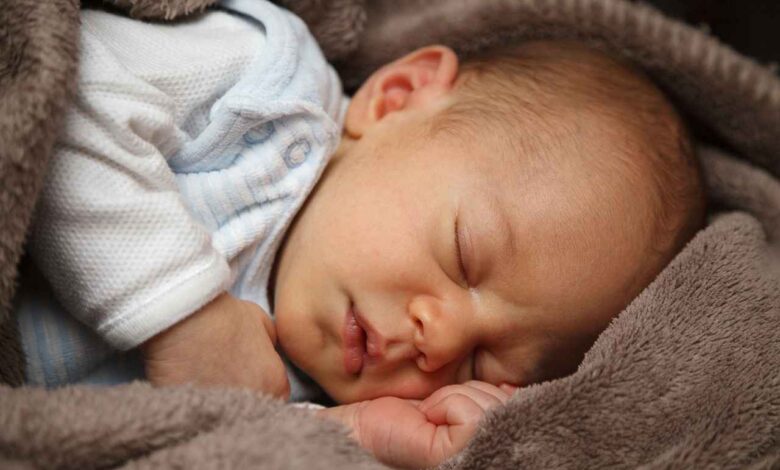When Do Babies Start Sleeping Longer at Night

If you’re a new mama or a nursing mom who’s worried about getting sleep-deprived and want to know when do babies start sleeping longer at night, then you’re in the right place.
In this post, i’m going talk about – when do babies start sleeping longer at night? Why do infants stay awake at night? And useful tips for better sleep at night.
Most infants nap more when they have no need for food – their stomach is filled and not feeling hungry.
Babies start sleeping longer at night when they start feeding on solids and when their night-rest schedule is properly map out. This usually happens towards toddler’s first birthday celebration.
Whatever sleepless night you are going through at the moment it is just momentary. As infants develop and mature, they begin to sleep for a more longer hours at night-time and stays more awake by day time.
Table of Contents
Why Do Infants Stay Awake at Night?
Before doing your research on when do babies start sleeping longer at night, you need to know what is making them to stay awake at night.
While in the belly, your infant snoozes more often and gets a constant flow of nourishment. However, this changes entirely second your child is born.
Suddenly, your little one needed to figure out how to be awake and eat at the same time. It becomes a huge deal for a newborn to achieve, and the new way of feeding requires a significant amount of time.
The changes babies go through to form new Eating and sleeping schedule in order to attained the developmental change required to live and grow in the outside world, is the number one cause why babies stay awake at night.
There are also other reasons why your baby is staying awake at night, such as fussiness caused by teething or gas. Also Acid reflux is another reason that could be preventing your child from sleeping the way they should.
In any case, if the troubles persist for protracted period of time. Let say your baby stays awake at night and still the trend right into his/her 5 to 6 months old, then see your pediatrician.
Factors That Affect Babies Sleep Schedule
Sleep Regression
Sleep regression is the point at which your toddler’s napping pattern changes; they wake up frequently during the night, and they struggle returning to sleep.
Sleep regression occurs swiftly and sometimes messes up a child behavior. The condition can affects kids of four months old, six to eight months old, ten months old, and even a year old. This period can last somewhere around one week to about a month.
Growth Spurts
Growth spurts are known to affect a child’s average sleeping time. Influenza, cold or sickness can make your child get fussy, restless. If you suspect some fever or other sickness see your pediatrician.
Your infant’s sleeping and feeding will return to normal in no time because growth spurts duration are generally short.
Unable to sleep alone
Here’s the place where self-comforting comes in. It could be your baby is not used to napping alone. Therefore, each time they wake up, you required to assistant to them fall back to sleep, even if it midnight.
When conditions are unfavorable
When the conditions are unfavorable for sleep, your baby may find it challenging to sleep deep and will keep waking up within night-time sleep.
Therefore, the environment where you keep your child child plays a huge role on how they sleep.
To Much Feeding
Some parents with the expectations of wanting their baby to sleep longer without waking up to feed end up stacking up their infant with food before bed. This idea is bad.
How do you feel when you end up consuming a huge portion of food right before bed – you become restless, unable to breath right? Those are the same way your baby feel too.

When Do Babies Start Sleeping Longer at Night?
It is practicality hard for newborn to sleep longer at night because of their tiny stomachs and wanting to feed at regular intervals during the night.
Babies will start sleeping longer the night as they reach the age of four to six months old. But, it is important to note that babies are not the same; they act and behave differently.
Some may start sleeping longer at night as early as 8 – 10 weeks. What works for baby A may not work for baby B. Therefore, when babies start sleeping longer at night always differs.
A study has shown that 70 to 80 percent of children will start staying asleep longer at night by nine months old. According to the National Sleep Foundation, somewhere in the range of 4 to 6 months old babies start getting the vast majority of their sleep at night rather than the day time.
As babies get older, the number of nighttime sleep will increase, and the hours of sleep during the day will decrease.
Table Representation of an Average Baby’s Sleep
| TOTAL SLEEP TIME (24-HR PERIOD) | AGE | DAYTIME SLEEP (DURATION) | SLEEP AT NIGHT (DURATION) |
| 15 –18 hours | Newborn | Wakes between 2 -3 hours to feed | 2 – 3 hours |
| 14 hours | 1 Month | 8 -10 hours (Wakes every 3 hours to feed) | 3 – 4 hours |
| 13 – 14 hours | 3 to 4 months | 7 – 8 hours with naps | 5 – 6 hours |
| 13 hours | 6 months | 2-3 hours (3 naps) | 6 – 9 hours |
| 12 hours | 9 months | 2 hours (1-2 naps) | 10 – 12 hours |
| 12 hours | 12 months | 1-2 hours (1-2 naps) | Up to 10 hours |
Effective Tips for Better Sleep for babies at Night
To help your baby become a good sleeper and sleep longer at night without interruption. Your knowledge about when do babies start sleeping longer at night is important. Study the following tips:
#1 Follow a Consistent, Calming Bedtime Routine
It becomes hard for your baby to settle-down to sleep when he/she have been overstimulated in the evening before bedtime. Endeavor to bath, cuddle, sing, play quiet music, or read to him relax.
Start these exercises before your infant is becomes too tired, do it in a calm, tenderly lit room, end in a swift way when you leave the room.
#2 Give Time to Settle Down
Give baby some time to find a comfortable position to fall asleep after crying or being fussy. In a case where the crying doesn’t stop, examine your infant, saying calming words, and leave the room.
All your baby needs to fall asleep might be your reassuring presence.
#3 Place Baby On the Bed When Tired, Yet Awake
This act will enable your infant to associate the process of placing him/her on the bed with sleep. Make sure to put your baby to sleep on their back, and clear away the bassinet of covers and other delicate things.
#4 Keep Evening Care Serene
When your child needs care or feeding during the night, utilize a dim light, calm voice, and subtle actions. It will signal your infant that it’s an ideal opportunity to sleep — not play.
#5 Think About a Pacifier
In situation where your child is experiencing difficulty settling down, a pacifier might work. Indeed, research studies has shown that utilizing a pacifier during sleep reduces the danger of SIDS (Sudden infant death syndrome).
#6 Pay Attention to Your Child’s Behavior
In the event that your child is an evening person or an early riser, you should adjust schedules and behaviors depending on these habitual tendencies.
Finally
To enable baby sleep better and longer at night, parent should have an understanding of what it takes for baby to start sleeping longer at night.
A better night sleep enhances your baby’s milestones development and encourages a good feeding schedule that meets their nourishment needs.
When do babies start sleeping longer at night? – Let me know your thought at the comment below. You can also stay in touch and follow us on Facebook, or Pinterest.








